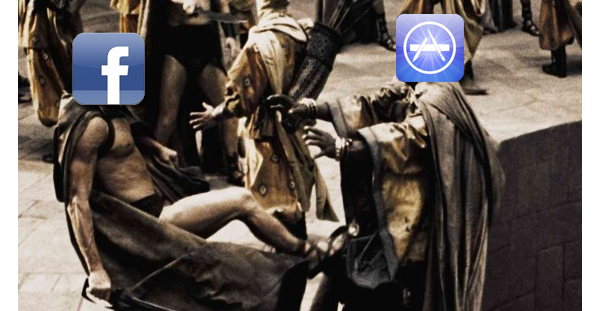Facebook is working on a top-secret project codenamed “Spartan”. It is said to be a mobile platform that runs in a web browser. We must say thanks to HTML5 support.An epic battle was needed, and pundits are already saying that this could spell the end of the Apple AppStore and the beginning of a new era in which Facebook would dominate the mobile world! Hubert Nguyen has reviewed on this project for ubergizmo. Lets checkout his findings bellow.
Apps and Sites/Web Apps: How are they different?
Apps and Sites each have pro and cons. An iOS app, runs with the native code of the hardware it was built for and may not use network communications. This means that the app is fast, more responsive and less resource intensive.
Websites (or “web apps”) run in a browser, so they use more resources (there are more layers to execute the code and to host the app) and their inherent network communications make them slower, or outright impossible to use if there’s no connectivity. On the bright side, web apps work on all devices that support a minimum browser feature set, and they don’t need to be updated periodically, it’s all done on the server side. In short, the web apps advantage is broad compatibility. The price to pay is slow performance is limited usability.
Because “Spartan” runs in a browser, pundits could also say that it might kill the Android Market too (and Windows and Mac OS as well). The thing is, “Apple” is a better choice for a nemesis because it generates more clicks to the articles… oh well, business is business.
Is HTML5 a “better” platform?
To stay on topic, the question is: can Spartan end the Apple Store domination in terms of iOS apps? In sheer numbers, and in a *very* distant future, it’s mathematically possible, although unlikely. In terms of app and user experience quality, probably not ever. That’s precisely why users have been screaming for an iPad Facebook app for a while – and it may just arrive soon.
Although I really like the idea of having apps running in the web browser, HTML5 is just not the most efficient platform to build many types of apps. Many developers would also tell you that creating Apps (and not websites) using a web platform is a pain in the… behind.
So why would developers do it? As usual, it comes down to money, politics and maybe a (tiny) zest of freedom. If a developer can build an app that is a natural fit for a web platform, there’s no reason not to do it. However, many developers seem to take the Spartan route because they want to escape Apple’s rules and *royalty fees* inside the app store (30% on apps and subscriptions). And if there is enough money at stake, it may very well be worth it for them. That said, the web is not fundamentally a better development platform for most of the money-generating apps in the store. Most of which are games.
What’s in it for the user?
So what’s in it for you and I (with Spartan)? It depends. If an app was only available on a given platform, making it available on the web (in HTML5) would serve everyone who did not have access to it in the first place. It’s a good thing. However, if you already had the native app on your platform, chances are that the web port will make the user experience slower and more clumsy, possibly actual end-user benefits. Ironically, Apple has been championed HTML5 as an alternative to… Flash.
The best part is: nobody knows for sure what Spartan is (well, except Facebook and key developers). Yet, the idea of Facebook is somewhat throwing punches at Apple seems to excite a large number of media outlets.
It will be interesting to see how developers might run from the Apple frying pan to jump into the Facebook fire. It’s just an expression… I’m not suggesting that Facebook will be worse. In fact, they *have to* make it better. One way or another, developers have to be on someone highway, and that someone might change the toll at some point… All the sudden, Windows and Mac OS feel so “free” and royalty-less (developers don’t pay royalties for those OSes).
Conclusion
I don’t like to predict the future, but it seems to me that Spartan won’t kill the Apple app Store. Of course, it can take away some revenues from it, but I bet that Apple’s generates the bulks of its apps royalties with Games, and those are fundamentally better as native Apps. Using all the modern computing power, we can now run Quake II on HTML 5, yay…. (It’s a 1997 game).
In fact, both can thrive at the same time and there is actually no drama to report. No one is going to die, and no real glory will come out of this. Yes, there will be a new “platform”, but would you be excited if I said ” Facebook apps coming to mobiles with new API”? Probably not. Well, that seems to be pretty much it. Sorry for deflating the bubble.
HTML5 has not killed Flash by any stretch of the imagination. Spartan and the web surely won’t kill the Apple App Store anytime soon. The Spartan name is catchy, and conveys the idea of a small heroic group of skilled people going against a giant adversary. They got the glory, but in the end, they all died.
Most iOS app developers were not get a real benefit from moving to Facebook’s Spartan. Making an app Facebook-centric does not mean that the app is “better”. If anything, it will be even more limiting for users and developers.
[ttjad keyword=”general”]



